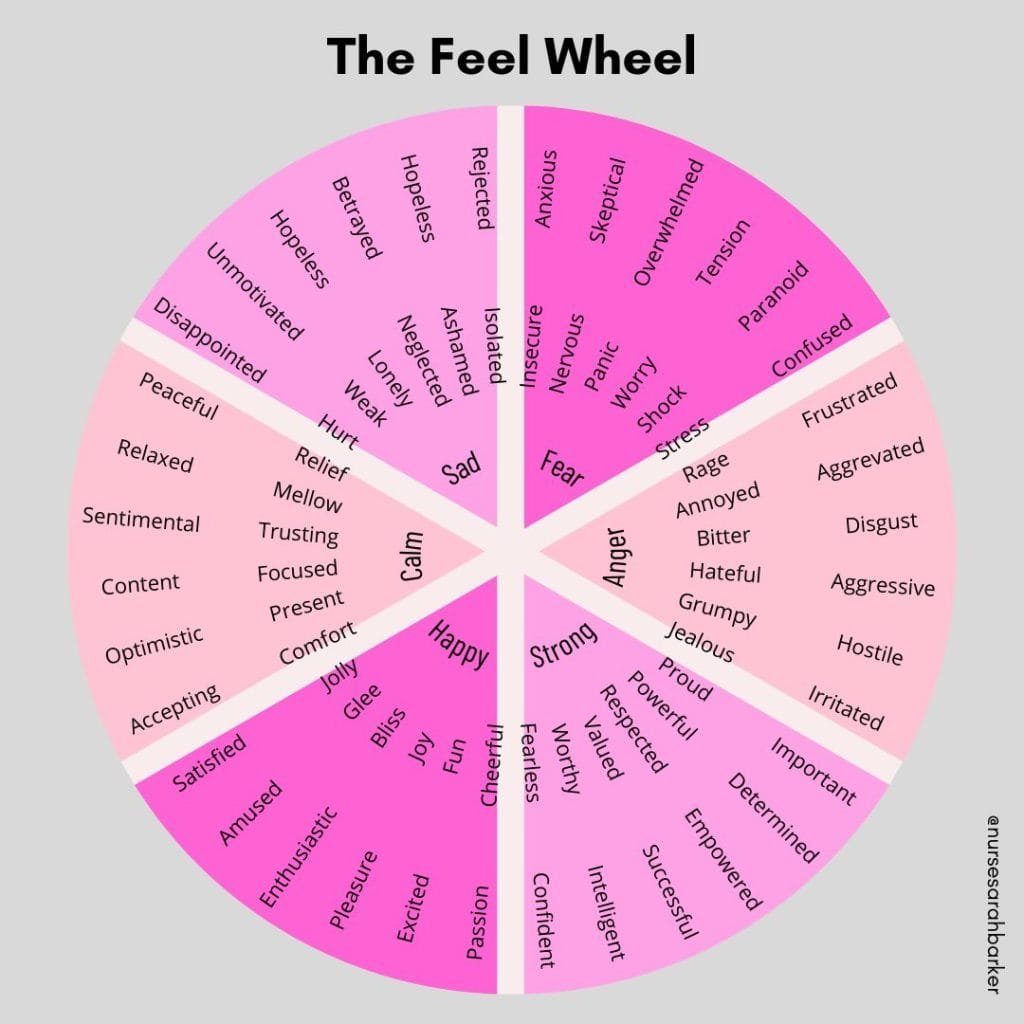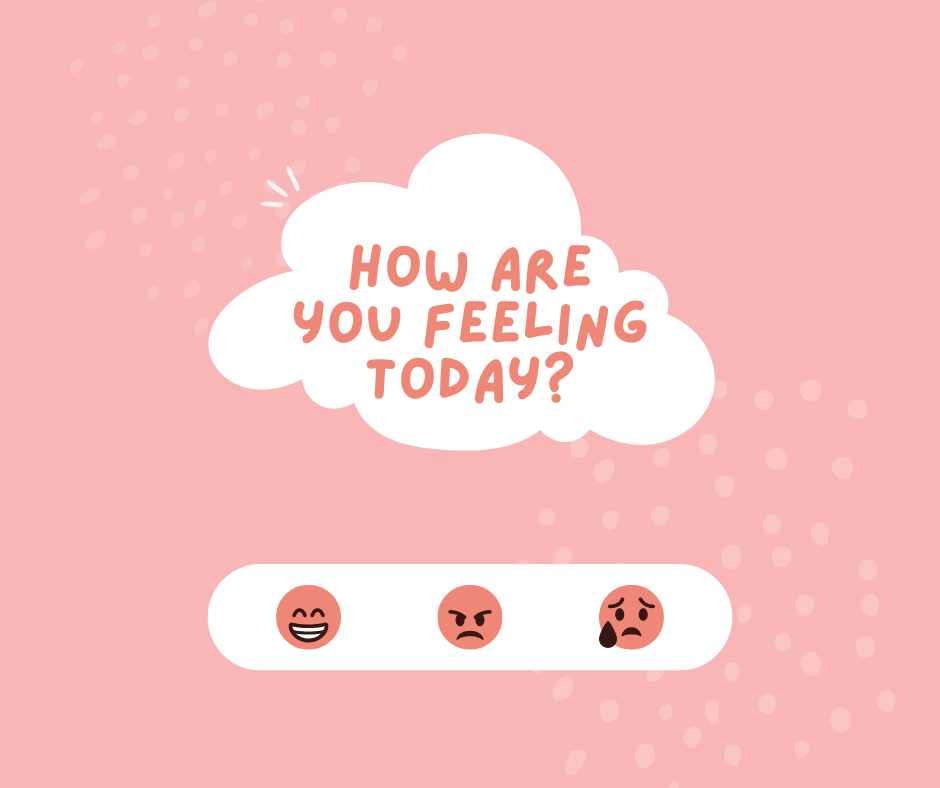Positive and Negative Emotions tell us how we feel.
Understanding what you’re feeling at a given moment can help you to make better decisions, move through uncomfortable emotions, and prevent some of those bad ‘feels’ in the future.
“How are you feeling?” is a way to show interest in someone’s health or well-being, but how often do we check this for ourselves?
What if I don’t know what I am feeling?
Naming your emotions as you feel them is not always easy.

Part of the problem, is that we are sometimes feeling several emotions at once. You might feel happy, but a bit scared or Sad and also angry.
When an individual has difficulty identifying, describing, and expressing emotions it is called Alexithymia. This term was coined by Peter Sifneos in 1972, and it comes from the roots of Greek words that literally mean, “lack of words for emotion.”
Positive emotions
According to research, the ten most common positive emotions are:
Amusement
Laughing or smiling at something unusual that is not serious, dangerous or threatening.
Awe
A feeling of being transfixed and overwhelmed by greatness or goodness on a grand scale, whether it is by nature or humanity, compelling us to see ourselves as part of something greater than ourselves.
Gratitude
The heartfelt appreciation of something in our lives, like someone who has helped us or having a comfortable place to rest.
Hope
Believing that things will change and get better.
Inspiration
A feeling of being riveted by human nature at its best and wanting to express yourself at your best because of it.
Interest
Feeling fascinated or challenged by something new.
Joy
A feeling of playfulness and delight in things or people.
Love
The feeling that encompasses all or most of these positive emotions within the context of a safe, often close relationship.
Pride
Taking credit for an achievement that is valued by others.
Serenity
A feeling of inner calm and contentment when things are going well for you.
Fredrickson, B.L. (2009). Positivity. New York: Crown Publishers.
Look at each of these ten positive emotions and think about what things in life bring out these feelings in you.
Everybody experiences pleasant feelings for different reasons. So we can’t tell you what things make you joyful or serene or interested, etc. Only you will know.
It is easy to think that positive emotions just happen to us as a result of creating or getting what we want in our lives. But they are not just the icing on the cake of a great life.
Positive emotions can help us create our best life! This is because they help to open our minds, build up our personal resources and undo the negative effects of stress.
The Positives of Positive Emotions
Positive emotions broaden your mind
When people were stimulated to experience positive emotions, as opposed to negative or neutral emotions, their minds opened up: their peripheral vision expanded so they could actually see more than they usually do. They also had more ideas and came up with better solutions to problems, they had a greater sense of ‘oneness’ with other people (they thought ‘we’ instead of ‘me’) and were more likely to reach out to help others.
Positive emotions help you build your best future
Over time, people who were encouraged to notice and develop their positive emotions showed an increase in psychological strengths such as optimism, acceptance of self and sense of purpose. Also, they showed an increase in good mental habits such as mindfulness and problem-solving. Their relationships also got stronger and aspects of their physical health improved.
Positive emotions help you bounce back from life’s challenges
When put into stressful situations, people who were encouraged to experience positive emotions returned to normal heart rate and blood pressure more quickly than those who were encouraged to experience neutral or negative emotions. This suggests that focusing on positive emotions during difficult times can help us recover more quickly.
Fredrickson, B. (2009) Positivity. Crown Publishers. New York.
Positive emotions are much more than a response to a physical sensation. Although they can arise from physical pleasure (e.g. good food, warm baths, watching a sunset, etc.) they also have a longer term effect on our wellbeing. The wonderful thing that research is telling us is that these positive emotions don’t just feel good now – they can help us have brighter, better futures.
Honest emotions
This is important! Positive emotions are no use to us if they are not honest and real. In fact, research suggests that insincere positive emotions can cause as much stress to our bodies as anger. Forcing yourself to smile or ‘put on a happy face’ may help you feel genuinely cheerful, which is fine. But if it’s just done to pretend to others that you’re happy when you’re not, it won’t have a positive effect on your wellbeing.
Negative emotions
Some common negative emotions are:
Anger
Displeasure, hostility or antagonism towards someone or something.
Contempt
Disrespect for a person or thing.
Disgust
A feeling of repulsion.
Embarrassment
Feeling ashamed when your inadequacy or guilt is made public.
Fear
Anxiety or apprehension about a possible or probable situation or event.
Frustration
Feeling annoyed at being hindered or criticised.
Guilt
Remorse caused by feeling responsible for some offence.
Sadness
A feeling of disadvantage, loss and helplessness.
Shame
The feeling resulting from an awareness of inadequacy, unworthiness or guilt.
Stress
Feeling strained when demand is greater than your capacity.
At times, negative emotions are appropriate and useful. It is only right that we should feel sad if someone we love dies. Feelings of anger can help give us the energy we need to stand up for fairness or justice. And fear helps to keep us away from things that could harm us.
However, some negative emotions are not helpful or healthy and we should try to reduce them. For example, we can spend too long beating ourselves up for a minor mistake we made or dwelling on a negative comment someone made about us.
Too many negative emotions can drag us into a downward spiral of despair, which can lead to a lack of energy and an inability to get the most out of our lives. If this goes too far, it can lead to depression and other mental health problems. We can learn to manage negative emotions so that they don’t overwhelm us.
This is why we need to have Emotional Equilibrium
Use Your Feels as Motivation
Emotions can be a sign that we really care about things.
Once you’ve identified what you’re feeling and why, use that information to move forward. Maybe you’re anxious about school or starting a new job, and you identify that you’re nervous because it matters to you.
Instead of shutting down or avoiding whatever’s causing those anxious feelings (awareness) helps you run to the emotion to say, ‘I’m going to do this because it’s important to me.’”
It can work in the other direction, too—if you’ve been forcing something that just doesn’t feel right, recognising those feelings of frustration and disappointment can help you realise it’s time to shut it down.


